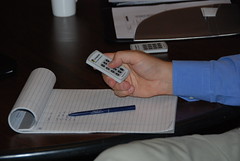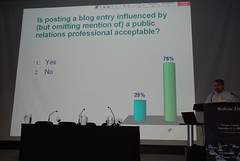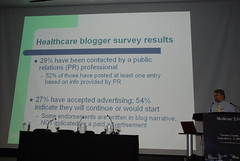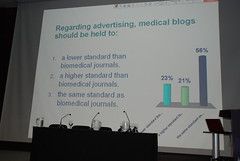Yesterday, Ivor Kovic and colleagues published the paper "Examining the Medical Blogosphere: An Online Survey of Medical Bloggers" in the Medicine 2.0 Theme Issue of the Journal of Medical Internet Research.
What I found most amazing about the results of his survey among medical bloggers is that a whopping 66% of those bloggers have received media coverage in mainstream media. Clearly, medical blogging is an "important vehicle to influence medical and health policy".
The potential impact of blogs on mainstream media and - eventually - policy has not escaped the attention of Public Relations professionals, who, in many instances, target bloggers as opinion leaders first. Bloggers - and especially medical bloggers - have therefore, in my opinion, a special responsibility for fact-checking and following other journalistic "best practices".
In the light of this I reflected on the presentation of Kevin Clauson (with Joan Dzenowagis from the World Health Organization) on Risk 2.0: The future of connected health at the Medicine 2.0 congress in Toronto, a few weeks ago. 
Kevin Clauson at Medicine 2.0, Sept 5th 2008 
Participants at Medicine 2.0 voting for questions posed by the speaker
Clauson used an interactive device to poll the congress audience. He asked the audience a few questions, among them whether they thought that it would be ethical for a blogger to post a blog entry that is "influenced by (but omitted mentioning of) a public relations professional". What I found surprising here was that 25% of the participants actually thought that this was not a problem! (I think it is!)
25% of the participants thought a blog "influenced by (but omitted mentioning of) a public relations professional" is ok
Clauson also cited results from the Healthcare blogger survey which say that 29% have been contacted by a PR professional, and 52% of those have posted at least one entry based on the info provided by the PR professional (the degree of disclosure is not known and would make an interesting research project).
Clauson's slide citing the Healthcare blogger survey
Also interesting was the fact that 56% of the Medicine 2.0 audience felt that, when it comes to advertising, blogs should be held to the same (ethical) standard as biomedical journals, and 21% even thought the standard should be higher. On the other hand, 23% thought the standards should be lower.
Voting results on "should blogs be held to the same (ethical) standard as biomedical journals?"
I think these results clearly show that some consensus building towards ethical standards for medical blogs is required, as well as some research on the quality and adherence to best practices.
The paper by Ivor Kovic and colleagues on "Examining the Medical Blogosphere: An Online Survey of Medical Bloggers" is an important first step in that direction.
Further information
Media Coverage on Kevin Clauson's and Joan Dzenowagis' Risk 2.0 panel at Medicine 2.0:
Digital Healthcare & Productivity (http://www.digitalhcp.com/2008/09/09/health20risk.html)
http://www.ihealthbeat.org/articles/2008/9/15/Health-20-Technology-Brings-New-Risks-to-Health-Care-Facilities.aspx?topicID=55
http://www.markle.org/weekly_digest/weeklydigest_vol.7_issue34.pdf
Add a comment